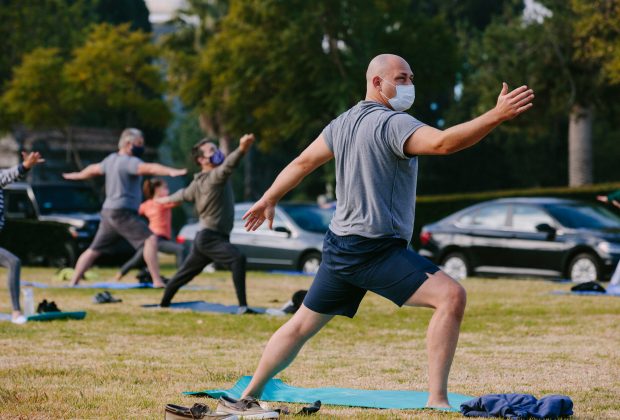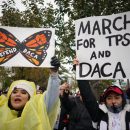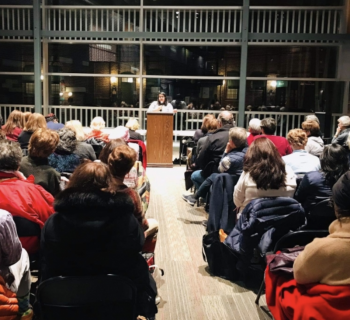By: Roni Caryn Rabin, New York Times - March 8, 2021
The Centers for Disease Control and Prevention on Monday issued long-awaited advice to Americans fully vaccinated against Covid-19, freeing them to take some liberties that the unvaccinated should not, including gathering indoors in small groups without precautions while still adhering to masking and distancing in public spaces.
The agency offered good news to grandparents who have refrained from seeing children and grandchildren for the past year, saying that vaccinated people may visit indoors with unvaccinated people from a single household so long as no one among the unvaccinated is at risk for severe disease if infected with the coronavirus.
In practice, that means fully vaccinated grandparents may visit unvaccinated healthy adult children and healthy grandchildren of the same household without masks or physical distancing. But the visit should be local — the agency still does not recommend travel for any American, vaccinated or not.
As cases and deaths decline nationwide, some state officials are rushing to reopen businesses and schools. Though federal health officials have repeatedly warned against loosening restrictions too quickly, fearing that the moves may set the stage for a fourth surge of infections and deaths, Wyoming’s governor said on Monday he would lift the state’s mask mandate, a move made by the governors of Texas and Mississippi in recent days.
The U.S. is averaging about 58,700 new confirmed cases daily, according to a New York Times database, plateauing at a level near the peaks reported last summer.
Coronavirus Restrictions by State
The new recommendations from the C.D.C. are intended to nudge Americans onto a more cautious path with clear boundaries for safe behavior, while acknowledging that most of the country remains vulnerable and many scientific questions remain unanswered.
“With more and more people getting vaccinated, each day we are starting to turn a corner, and as more Americans are vaccinated, a growing body of evidence now tells us that there are some activities that fully vaccinated people can resume at low risk to themselves,” Dr. Rochelle Walensky, the C.D.C. director, said at a White House news conference on Monday.
But, she added, “While we work to quickly vaccinate people more and more each day, we have to see this through.”
The new advice is couched in caveats and leaves room for amendments as new data become available. The guidance is a “first step,” Dr. Walensky said. “It is not our final destination.”
The agency did not rule out the possibility that fully vaccinated individuals might develop asymptomatic infections and spread the virus inadvertently to others, and urged those who are vaccinated to continue practicing certain precautions.
The new guidelines provide much-needed advice to individuals who remain reluctant to resume in-person, face-to-face interactions even after being vaccinated, said Vaile Wright, senior director for health care innovation at the American Psychological Association.
About half of all adults are anxious about re-entering normal life, including 44 percent of those who have been fully vaccinated, Dr. Wright said, citing soon-to-be published research from the American Psychological Association.
What You Need to Know About the Vaccine Rollout
-
- Providers in the U.S. are administering about 2.1 million doses of Covid-19 vaccines per day, on average. About 59 million people have received at least one dose, and about 31 million have been fully vaccinated. How many people have been vaccinated in your state?
- The U.S. is behind several other countries in getting its population vaccinated.
- In the near future, travel may require digital documentation showing that passengers have been vaccinated or tested for the coronavirus.
- When can you get the vaccine? What are the vaccine’s side effects? Is it safe to get one during pregnancy? We have answers to many of your questions.
Agency officials encouraged people to be inoculated with the first vaccine available to them, to help bring the pandemic to a close and a resumption of normal life. The agency emphasized that vaccines are highly effective at preventing “serious Covid-19 illness, hospitalization and death,” and said its guidance “represents a first step toward returning to everyday activities in our communities.”
As of Monday, about 60 million people have received at least one dose of a Covid-19 vaccine, including about 31.5 million people who have either been fully vaccinated by Johnson & Johnson’s single-dose vaccine or the two-dose series made by Pfizer-BioNTech and Moderna, according to a New York Times database. Providers are administering about 2.17 million doses per day on average.
The C.D.C.’s advice is aimed at Americans who are fully vaccinated, meaning those for whom at least two weeks have passed since they received the second dose of the Pfizer-BioNTech or Moderna vaccines, and those for whom at least two weeks have passed since receiving a single dose of the Johnson & Johnson vaccine.
What is safe for newly vaccinated Americans and their unvaccinated neighbors and family members has been uncertain in large part because scientists do not yet understand whether and how often immunized people may still transmit the virus. If so, then masking and other precautions are still needed in certain settings to contain the virus, researchers have said.
There is also uncertainty about how well vaccines protect against emerging variants of the virus, and how long the vaccine protection lasts.
The C.D.C. said that “a growing body of evidence” suggests that people who are fully vaccinated are less likely to have asymptomatic infections and “potentially less likely to transmit the virus that causes Covid-19 to other people.” Still, the agency did not rule out the possibility that they may inadvertently transmit the virus.
By: Roni Caryn Rabin, New York Times - March 8, 2021







